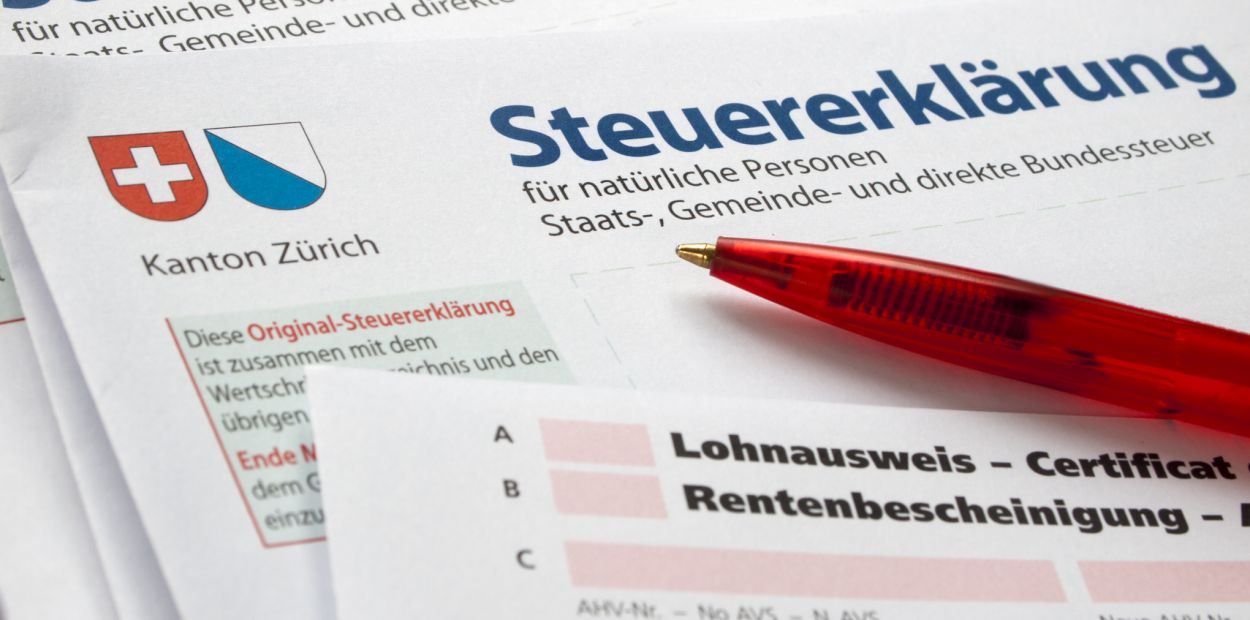
Switzerland is one of the wealthiest countries in the world — 15.7% of the adult population are millionaires, putting the country far ahead globally. This makes Switzerland an attractive destination for expats. Foreigners planning a move to Switzerland should be aware of the following tax obligations:
Income taxes vary significantly depending on your place of residence — in addition to the federal tax, each canton and municipality sets its own tax policy:
Location plays a major role in assessing your tax burden. Anyone planning to settle in Switzerland will benefit from expert advice to compare and reduce taxes and insurance costs. Zürcher Treuhand GmbH and Simplecare.ch AG offer comprehensive and results-oriented support for new residents — contact us today.
What many newcomers find surprising: In Switzerland, both the canton and the municipality levy an annual wealth tax.
No tax is levied on winnings from Swiss casinos (lottery and sports betting winnings are only taxed above CHF 1 million). However, these winnings increase your wealth and therefore indirectly affect your wealth tax.
Inheritance tax varies greatly in Switzerland, as it is regulated by the cantons. The degree of relationship is decisive.
Anyone receiving a significant gift may be subject to gift tax. As with inheritance, the relationship and the local exemption limit determine the amount of tax. The tax rates for inheritance and gifts are usually the same in most cantons. Therefore, giving a gift before death does not automatically avoid taxes. However, splitting gifts over several years can reduce the tax burden, depending on the canton.
It is generally advisable to consult a professional trustee for high-value gifts. If you want to ensure that a gift does not become a burden, contact Zürcher Treuhand GmbH for a personal consultation today.
The following rules apply to foreigners planning to purchase property in Switzerland:
Property owners in Switzerland are subject to the imputed rental value — a notional rental income that is taxed as income based on the property's location and market value. This applies even if the owner lives in the property. However, mortgage interest and maintenance costs can be deducted.
Additional possible taxes:
The so-called withholding tax applies to:
The employer deducts the tax directly from the salary and forwards it to the tax authorities. If your gross annual income exceeds a certain threshold (e.g., CHF 120’000 in the canton of Zurich) or if you have additional income, you will need to file a standard tax return (subsequent ordinary assessment, NOV).
Those who move to Switzerland without working here and who possess significant wealth may qualify for flat-rate taxation under certain conditions.
The tax authorities rarely classify individuals as professional traders. However, if certain criteria such as volume, trading frequency, and financing methods are met, particularly successful traders may be subject to closer scrutiny. In practice, the vast majority of private investors never have to worry about this status.
Those who want to allocate some of their disposable income to future planning should consider making contributions to Pillar 3a. This private pension scheme allows annual tax deductions up to a legally set maximum (CHF 7’258 for 2025). Upon retirement, the 3a funds are taxed at a reduced rate.
If you have further questions about your individual tax situation in Switzerland, we recommend a personal consultation with Zürcher Treuhand GmbH. We will guide you through all financial and tax-related matters — from immigration to estate planning.
Taxes are an important topic in Switzerland. The differences, regionally and in the way of taxation, are often discussed. It is precisely these differences that are worth taking a closer look at. Because with clever tax planning, you can save several thousand francs per year. Find out here how you can also sustainably reduce your tax burden with the most important starting points.
If a company generates more than CHF 100,000 in taxable sales, it becomes liable for VAT in Switzerland. This also applies to foreign companies if they generate part of their sales here. . In this article we explain the two methods, their advantages and disadvantages, and how you can change your accounting method.
Foreigners residing in Switzerland and cross-border commuters pay tax on their income directly at source. This means that their taxes are deducted directly from their wages each month. Employers must take care of the declaration and payment of taxes to the authorities.
Real estate is always in high demand in Switzerland, but the market has rarely been as favorable for sellers as it is now. If you make a profit from selling your property, the cantons impose a toll known as the real estate gains tax. Here we explain everything you have to know.
The participation exemption in Switzerland can provide tax relief for companies that receive participation income from subsidiaries. Zürcher Treuhand tells you what you need to know about the participation exemption.
Switzerland is one of the wealthiest countries in the world — 15.7% of the adult population are millionaires, putting the country far ahead globally. This makes Switzerland an attractive destination for expats. Foreigners planning a move to Switzerland should be aware of the following tax obligations.